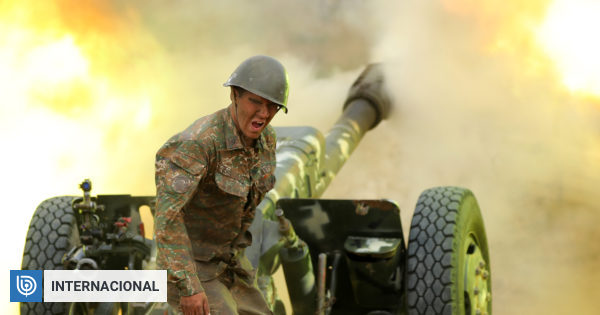
[ad_1]
Armenia considered Wednesday that it is premature to think of negotiating with Azerbaijan with a Russian mediation, on the fourth day of intense fighting in Nagorno Karabakh, Armenian separatist enclave in Azerbaijani territory supported by Yerevan.
Armenian Prime Minister Nikol Pashinyan closed the door to immediate negotiations, hours after a unanimous vote by the UN Security Council to end hostilities and “resume constructive negotiations as soon as possible.”
“It is not appropriate to speak of an Armenia-Azerbaijan-Russia summit, at a time when there is intense fighting,” he told the Russian press, according to the official Interfax news agency, considering that “for negotiations to take place, a suitable atmosphere and conditions are necessary.”
Russia, a regional power in the South Caucasus, maintains cordial relations with Armenia and Azerbaijan, both former Soviet republics. The Armenian government is part of a Moscow-dominated military alliance, supplying arms to both sides.
The Kremlin, which calls for an immediate cessation of the fighting, the most serious since 2016, said it was ready for mediation, in a very unstable region that could be shaken fully if an open war breaks out between the two countries
Russia, France and the United States are the three mediators in the conflict within the so-called Minsk Group that, since 1992, it has not been able to find a durable solution in Nagorno Karabakh, a territory that declared itself independent from Azerbaijan with the support of Armenia. A war in the early 1990s caused 30,000 deaths.
According to official accounts, probably partial, the clashes that began on Sunday left 98 dead, including 81 separatist fighters and 17 civilians from both sides.
Azerbaijan did not report any military losses, and the two camps are accused of starting hostilities.
“Great pride”
The death toll could be much more important. The Azerbaijani Defense Ministry indicated that “intense fighting” continued on Wednesday, and that since the weekend, 2,300 Armenian separatists perished.
At the same time that it accuses its adversary of attacking civilian positions, the ministry claims the destruction of 130 tanks, 200 artillery pieces, 25 anti-aircraft batteries and S-300 surface-to-air missiles.
For his part, the spokesman for the Armenian Ministry of Defense, Artsroun Hovhannisian, mentioned “137 tanks and armored vehicles destroyed, 72 drones, seven helicopters and a war plane shot down. 790 Azerbaijani soldiers were killed and 1,900 wounded ”.
At the moment, all this data could not be verified with an independent source.
In both countries, a rhetoric of war in recent months has fueled patriotic fervor. After the mobilization and martial law were decreed in the two territories, numerous volunteers showed up to fight at the front.
“It is a very proud feeling. We have been waiting for it for 25 years, ”Shaddin Rustamov, a 25-year-old Azerbaijani recruit in Baku, told Agence France-Presse.
Azerbaijan claims to have reconquered territories and disrupts Armenian supply lines. Nagorno Karabakh says, for his part, that he resumed positions.
Possible internationalization
Armenia said Tuesday that a Turkish fighter-bomber, in support of Azerbaijan, had shot down one of its military aircraft, which Ankara and Baku quickly denied.
A direct military intervention by Turkey would mean a major turnaround and the internationalization of the conflict.
Ankara is the only power that did not call for a ceasefire. On the contrary, he encouraged his Azerbaijani ally to regain control of Karabakh by force and to humiliate his historical enemy, Armenia.
The Kremlin called Turkey on Tuesday, with whom it maintains complicated but pragmatic relationships, to refrain from “adding fuel to the fire.”
“We are close to a full-scale war, perhaps even regionally,” warned Olesya Vartanyan, an analyst at the International Crisis Group.
The European Court of Human Rights (ECHR) urged both sides to refrain from any action “that could lead to violations of the rights of civilian populations.”
The NGOs Human Rights Watch and Amnesty International also asked to avoid “attacking” the civilian population.
[ad_2]